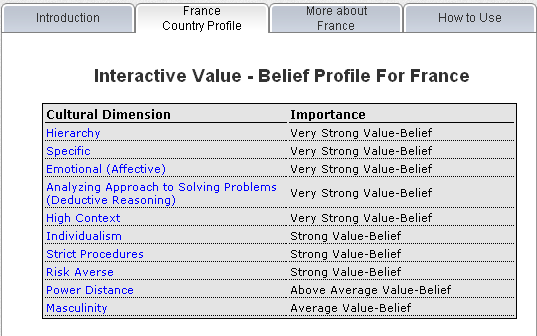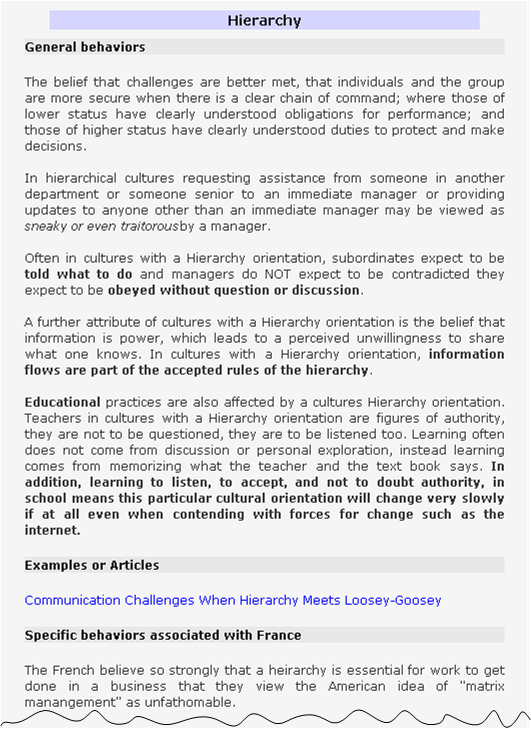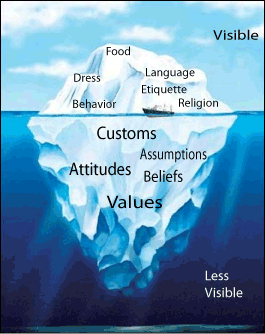Working Globally offers 100s of practical tips to help you avoid embarrassing mistakes, get to “yes” when negotiating, create productive and effective multi-cultural teams, and prepare for life in a foreign country.
Want to know when or if to make a concession when negotiating with Russians? Simply open the Russian country profile and check negotiating strategies.
Need to conduct a “brain-storming” session at the kickoff of a Japanese-Brazilian joint venture? Simply click the menu option “issues between nations” and select Japan and Brazil.
Are you German project manager, working for an American company, developing software for a French company, using Indian developers and Chinese tech writers? Do you need a strategy to motivate the Indians to develop the software asap? Working Globally’s “national profiles” and “issus between nations” will alert you to potential problems and supply you with field-tested solutions.
Working Globally provides you with the easiest and most intuitive way to enhance your multi-national business skills.
Working with other nationalities is unlike anything you've ever experienced.

Why???
Because every nationality has its own beliefs about business relations; for example:
Your personality, your leadership style, and your feelings concerning national business differences will affect your performance in multi-national assignments. Understanding these aspects of yourself will alert you to the ease or difficulty you will have working with other nationalities.
Our personality, leadership, and buisness beliefs questionnaires will help you understand and will help you identify critical differences between you and your multi-national colleagues.
Check out our quick demo video to see how this site can help: ** Demo coming soon.
Did you know that more than 30% of unsuccessful expat assignments fail because of family not business issues?
Want to know what the challenges are? How to prepare for them? What to do when they arise? Working Globally offers two approaches:
You can simply go to our National Profiles and click on “living guides”, this will give you lots of country specific suggestions and tips for adjusting to life in your new country, or
Take our on-line course on “living abroad” which provides a short program designed to bridge cultural barriers for international transferees and their families.

If you have a question, we’re here to help. Our extensive Support Center has easy-to-follow, step-by-step tutorials containing screenshots and videos to make sure you’re able to quickly find answers to your questions.
We understand that sometimes you’ll need one-on-one, personal assistance too. This is where many companies would leave you hanging, but we’re proud to offer fast, email-based support to all of our customers. Our friendly, knowledgeable support team works around the clock to answer your questions, usually within a couple hours!
To succeed in multi-national negotiation, you need to know how to communicate with and influence people whose values, beliefs, and negotiating practices differ from your own.
Should you overwhelm with facts or appeal to emotions? Should you make concessions or stand firm? Are your bargaining partners expecting a long-term relationship or are they only interested in the immediate business at hand? Who is likely to have the authority to approve the deal? Is time often or seldom an Issue? What are the likely strengths and weaknesses of you bargaining partner?
Your best strategy and most appropriate goal will depend on the nationality of your bargaining partner
A growing body of research documents the range of different national negotiating styles.
Working Globally has incorporate this research into its country profiles and national comparisons.
Want to know how Indians negotiate? Simply open the Indian country profile and check negotiating strategies. Want a list of likely negotiating differences? Simply go to national comparisons, select India and your country, and check negotiating issues.
Successful managers are respected and trusted by their subordinates, peers, and managers, because they get the job done by using effective strategies to lead, plan, communicate, motivate, and make decisions.

But strategies that work in one country don't always work in another! How can you know which strategy will be most effective with your superiors, peers, and subordinates?
Our National Profiles use the values and beliefs of each nation to explain what managers expect of their subordinates, what subordinates expect from their managers, and what peers expect of peers. These expectations provide the clues for choosing the best strategies.
Our National Profiles provide the answers to these and many more questions. Our National Comparisons use these answer to identify cross-national management strategies that will be effective with your multi-national colleagues.
Working Globally has more than 100 national profiles which we continuously update with on-going research and with the experiences of the Working Globally community.

Our national profiles use the values and beliefs of each nation to explain national behaviors and business practices. For example, in China contracts tend to be vague and are not considered to be very important, this is because the Chinese believe relationships not contracts are the best basis for trust. If you want a successful business partnership in China, you must allocate the time and energy needed to establish good personal relationships.
Below is a sample of the values and beliefs profile for France, and a description of the behaviors and business practices resulting from the French belief that work is done most efficiently when there is a clear chain of command. If you are attempting to reorganize a French business group be aware that the French view the American idea of “matrix management” as incomprehensible.


The key to working effectively with multi-national partners is to identify the differences in values and beliefs.

If you are unaware that your business partner believes that harmony is essential in maintaining a respectful business relationship and that ambiguously answering questions, especially if the news is bad, fosters harmony. And you believe that complete, unambiguous honesty, even for bad news, is most important in maintaining an effective business relationship. You are likely to misunderstand what your partner says, have faulty expectations due to this misunderstanding, and judge that your partner cannot be trusted.
Working Globally makes it easy for you to identify the likely differences between your values and beliefs and those of your multi-national business partners. Our “national comparisons” allow you to select your country and your partner’s country and then present you with a table of likely differences rated from very likely and very important to not likely and/or not important.
Understanding that your business partner’s actions are shaped by beliefs and values that differ substantially from yours, will enable you to properly interpret and respect your business partner’s behavior. Which in turn will foster better understanding and a more effective business relationship.
In addition, Working Globally provides suggestions and strategies for recognizing and overcoming challenges that result from these national differences.
The study of how to succeed in the global workplace includes several areas of research:
The Working Globally community undertakes research in all these areas and here at Working Globally we continuously monitor the results of this research so that we can make you aware of the latest and most powerful models and up-to-date conclusions.
For example, our on-line course “working abroad” will walk you through:
We don’t mean to brag, but our "country profile" and "national comparison" tables are features that really set Working Gloabally apart from the crowd. National Comparison table is our fabulous tool that makes it a breeze to identify all the issues you are likely to face working with your multi-national partners. With one click, you can see all the issues and get a list of detailed behaviors along with full explanations of why the behaviors differ from yours and how best to work effectively.

We built the country profile and national comparison tables into Working Globally because we believe you shouldn't have to spend days doing google searches attempting to get the information you need. Well, now you don’t have to!
We have created a new way of looking at national differences and how they affect business. A straight forward way to help you work more effectively with your multi-national colleagues.
When you interact with other nationalities sometimes you sense and interpret things correctly, some times you sense but misinterpret, and some times you don't even sense what is happening. Our site will increase your ability to properly interpret what you sense and sense more of what your multi-national colleagues are actually doing and saying. We do this by helping you recognize the things that can't be seen, heard, or tasted (the things that can be seen, heard, and tasted, are the easy national differences such as dress, food, music, or greetings - often called "the tip of the national iceberg").
We focus on the differences that lie below the surface, that are hidden from view unless you know what to look for and where to look. These are differences in national beliefs and values, and these are the important national differences that affect peoples business attitudes and behaviors.
To work globally you need a vocabulary of importnat national differences.
You can't manage what you can't describe.
You can't manage a behavior without understanding the underlying belief.
On this site we explain 36, research-based, national differences which affect management strategies and organizational processes. These differences are caused by 72 unique national preferences.
Each national preference is described in terms of beliefs and values and in observable and measureable behavior.
Understanding these national preferences gives you the vocabulary to properly describe the actions you observe of those from other countries. And this description will enable you to discuss challenges before they become problems or to overcome problems that have arisen.

The Working Globally community consists of individuals working with people whose culture differs from their own, and managers, team participants, and individual contributors who have worked abroad, are working abroad, or have worked abroad; as well as their families and those who study the effects of culture on business.
The community includes: anthropologists, psychologists, sociologists, and business researchers and practitioners. What all these people have in common is that they are either studying, or their business success depends on understanding, national cultures.
Working Globally supports this community by providing simple, intuitive access to national profiles and comparisons, and by enabling community members to share their experiences and insights in this increasingly important area of globalization.
To participate, simply sign up, it’s free. Once you have signed up you can submit questions to the community and start helping others by sharing your knowledge.

